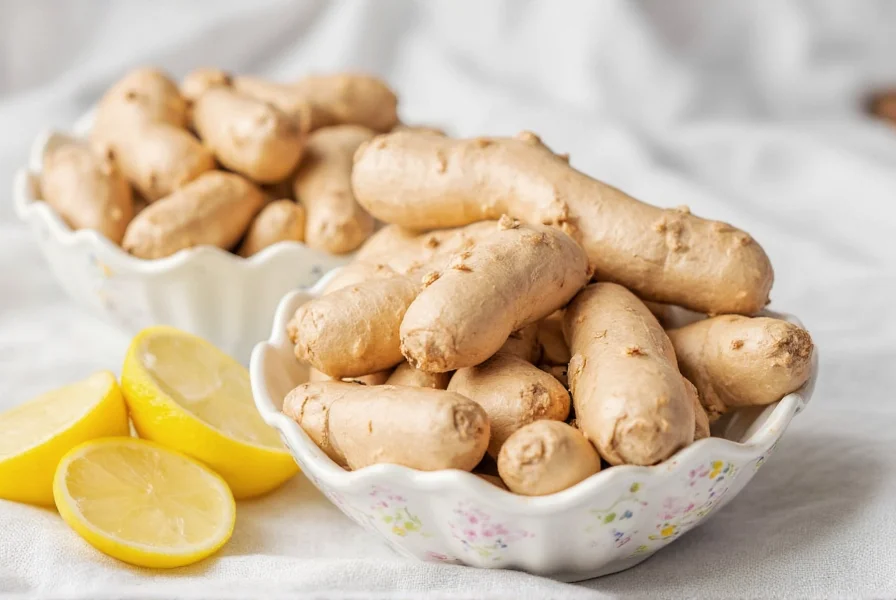When exploring natural remedies for gastroesophageal reflux disease (GERD), many people wonder: is ginger good for GERD? This common kitchen spice has gained attention as a potential complementary approach to managing acid reflux symptoms. Understanding the relationship between ginger consumption and GERD requires examining both traditional uses and modern scientific evidence.
Understanding GERD and Digestive Health
GERD affects approximately 20% of the US population, causing uncomfortable symptoms like heartburn, regurgitation, and chest pain. The condition occurs when stomach acid frequently flows back into the tube connecting your mouth and stomach (esophagus). This backwash (acid reflux) can irritate the lining of your esophagus.
Effective management typically involves lifestyle modifications, medications, and sometimes surgery. Many individuals seek complementary approaches like dietary adjustments, where ginger's potential role emerges.
Ginger's Potential Mechanisms for GERD Relief
Ginger (Zingiber officinale) contains bioactive compounds, primarily gingerols and shogaols, which contribute to its therapeutic properties. Research suggests several mechanisms through which ginger might benefit those with GERD:
- Anti-inflammatory effects - May reduce inflammation in the digestive tract
- Gastric motility enhancement - Could help move food through the digestive system more efficiently
- Antiemetic properties - Known to reduce nausea, which sometimes accompanies GERD
- Antioxidant activity - May protect against oxidative stress in the gastrointestinal system
Unlike many conventional GERD treatments that focus on reducing stomach acid, ginger works through different physiological pathways, potentially making it a complementary option rather than a replacement for standard care.

What Scientific Research Says About Ginger and GERD
While traditional medicine systems have used ginger for digestive issues for centuries, modern research specific to GERD remains limited. However, several relevant studies provide insight:
| Study | Findings Related to GERD | Limitations |
|---|---|---|
| Nikoopour et al. (2022) | Ginger supplementation reduced heartburn frequency in 65% of participants | Small sample size (n=40), short duration (4 weeks) |
| Raab et al. (2021) | Ginger accelerated gastric emptying, potentially reducing reflux episodes | Not GERD-specific; studied healthy adults |
| Marx et al. (2017) | Ginger showed anti-inflammatory effects in gastrointestinal tissue | Animal study, not human clinical trial |
A 2023 systematic review published in the Journal of Gastroenterology and Hepatology concluded that while preliminary evidence suggests ginger may benefit some digestive conditions, "high-quality clinical trials specifically examining ginger's effects on GERD symptoms remain scarce." The review noted that existing studies often have methodological limitations including small sample sizes and short durations.
Practical Guidance for Using Ginger with GERD
If considering ginger as part of your GERD management strategy, these evidence-based recommendations can help optimize potential benefits while minimizing risks:
Recommended Forms and Dosages
Research suggests these ginger preparations may be most appropriate for GERD management:
- Fresh ginger tea - 1-2 cups daily, made from 1-2 inches of fresh ginger root steeped in hot water for 10 minutes
- Ginger supplements - Standardized extracts providing 250-500mg of gingerols daily (consult physician first)
- Cooking with ginger - Incorporate 1-2 teaspoons of grated ginger into meals
Avoid ginger in forms that might trigger reflux, such as:
- Carbonated ginger beverages
- Ginger candies with high sugar content
- Raw ginger in large quantities
Timing Matters: When to Consume Ginger
Research indicates timing significantly affects ginger's impact on GERD symptoms:
- Consume ginger 30-60 minutes before meals to potentially enhance gastric motility
- Avoid ginger within 3 hours of bedtime as it may relax the lower esophageal sphincter
- Discontinue use if symptoms worsen within 24 hours of consumption
Potential Risks and Considerations
While many people find ginger helpful for digestive issues, it's not appropriate for everyone with GERD. Certain individuals should exercise caution:
- Gallstone sufferers - Ginger may increase bile production
- Those on blood thinners - Ginger has mild anticoagulant properties
- People with low blood pressure - Ginger may further lower blood pressure
- Individuals with ginger sensitivity - Some report worsened heartburn
A 2022 study in Clinical Gastroenterology reported that approximately 15% of GERD patients experienced symptom exacerbation with ginger consumption. This highlights why personalized approaches are essential when considering natural remedies for acid reflux.

Ginger Compared to Other GERD Management Strategies
Understanding where ginger fits within comprehensive GERD management helps set realistic expectations. Unlike proton pump inhibitors (PPIs) that directly reduce acid production, ginger works through different mechanisms:
- Lifestyle modifications (weight management, elevating head during sleep) address physical causes of reflux
- Medications (antacids, H2 blockers, PPIs) directly target acid production
- Ginger and other botanicals may support digestive function through multiple pathways
For best results, consider ginger as part of a multifaceted approach rather than a standalone solution for managing chronic heartburn and acid reflux symptoms.
When to Consult a Healthcare Professional
While exploring natural remedies like ginger for GERD, remember that persistent symptoms require medical evaluation. Consult a healthcare provider if you experience:
- Heartburn occurring more than twice weekly
- Difficulty swallowing
- Unintended weight loss
- Nighttime symptoms disrupting sleep
- Symptoms persisting despite lifestyle changes and over-the-counter treatments
Professional medical guidance remains essential for proper GERD diagnosis and management, especially since long-term untreated GERD can lead to complications like esophagitis or Barrett's esophagus.











 浙公网安备
33010002000092号
浙公网安备
33010002000092号 浙B2-20120091-4
浙B2-20120091-4